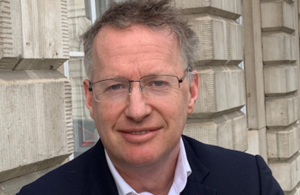Government names preferred candidate for Charity Commission Chair
News story
Orlando Fraser is the Government’s preferred candidate for the Charity Commission Chair, the Culture Secretary Nadine Dorries announced today.

Orlando Fraser has been a commercial barrister for nearly 30 years, practising at 4 Stone Buildings. He was appointed Queen’s Counsel in 2014. Previously he served on the board of the Charity Commission from 2013 to 2017, where he acted as one of two statutory legal members and Chaired the Governance & Remuneration Committee as well as the Policy & Guidance Committee. Orlando has also served on the Civil Justice Council and the National Council for Voluntary Organisations’ Advisory Council.
Orlando’s involvement in the voluntary sector stretches back to 1992, when he took an aid convoy to Bosnia to help its Muslim population. Since then he has served on the Management Committee of a West London refuge for women victims of domestic abuse, served as a Governor of Ilfracombe College, edited the voluntary sector sections of Centre of Social Justice’s “Breakdown Britain” and “Breakthrough Britain” reports, and supported the Rugby Portobello Trust charity through the 2017 Grenfell tragedy. Apart from the Rugby Portobello Trust, Orlando supports a number of other charities.
Orlando says:
As I know from experience, the Charity Commission is a much-respected independent regulator, supervising world-class charities. I am honoured to be offered the responsibility of chairing it going forward.
Orlando Fraser will now appear before MPs on the Digital, Culture, Media and Sport Select Committee for pre-appointment scrutiny (date to be confirmed).
Under the terms of the legislation, the appointment is made by the Secretary of State. The appointment process for this role was conducted in line with the Governance Code on Public Appointments with due process followed at all times.
Ministers were assisted in their decision-making by an Advisory Assessment Panel which included a departmental official and a senior independent panel member approved by the Commissioner for Public Appointments.
ENDS
Notes to editors
- The appointment is for a term of three years. The role is for two and a half days per week, remunerated at £62,500 per annum.
- This appointment is made in accordance with the Cabinet Office’s Governance Code for Public Appointments.
- The regulation of public appointments against the requirements of this code is carried out by the Commissioner for Public Appointments.
- In accordance with the Code, it should be publicly disclosed if a successful candidate, has, in the last five years, been employed by a political party, held a significant office in a party, has stood as a candidate for a party in an election, has publicly spoken on behalf of a political party, or has made significant donations or loans to a party. Orlando Fraser has not declared any political activity in line with these requirements.
Published 8 March 2022

